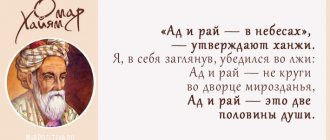Updated January 20, 2021
Hello, dear readers of the KtoNaNovenkogo.ru blog.
Brevity is the soul of wit!
Almost every person knows this famous phrase of Anton Pavlovich Chekhov (in Russia absolutely for sure). And most regularly use it in their vocabulary.
And today she will be our “guiding star”. Because, firstly, we will talk about aphorisms, and this is one of their clearest examples.
And, secondly, following the behest of Anton Pavlovich, we will try to briefly and clearly (and hopefully, talentedly) explain what this term is.
What are aphorisms?
Aphorisms are catchphrases, stable phrases said by someone, most often invented by poets or writers. These are the statements that have become popular among the population and are often used as a single lexical whole, without separating individual words. An example of an aphorism is the expression of M. Zhvanetsky: “It is difficult to enter history, but it is easy to get into trouble.”
Aphorisms of Omar Khayyam
The lower man soul, the higher nose up.
He who has been beaten by life will achieve more; he who has eaten a pound of salt values honey more highly. He who shed tears laughs sincerely. He who died knows that he lives!
To live your life wisely, you need to know a lot. Remember two important rules to begin with: You’d better starve than eat anything, And it’s better to be alone than with just anyone.
One will not understand what roses smell like... Another will extract honey from bitter herbs... You give someone a change, they will remember it forever... You will give your life to someone, but he will not understand.
Omair Khayyam. Adelaide Hanscom Leeson, 1905-12 https://img.anews.com/media/gallery/117644052/71811035.jpg
Origin of the term "aphorism"
The term "aphorism" comes from a Greek word that translates as "definition." Indeed, this is a definition of one or another action, deed, feeling, event, dressed in a literary statement.
An aphorism is an original thought that is characterized by logical completeness. Such expressions are easy to remember, due to their clarity and conciseness, and are repeated many times by people. Often an aphorism consists of 3-5 words, but there are also more detailed statements.
An example of a short aphorism is the popular expression of Francis Bacon: “Knowledge is power.” It explains as accurately as possible the importance and significance of knowledge in the life of mankind.
Aphorisms about women
It is a sin if a woman looks less beautiful than she could be. (Miguel Cervantes de Saavedra)
A woman should soften, not weaken a man. (Sigmund Freud)
It has always been unclear to me why the worst of men attract the interest of the best of women. (Agatha Christie)
Women just have amazing instincts. They notice everything except the most obvious. (Oscar Wilde)
Women, like queens, hold nine-tenths of the human race captive in slavery and hard labor. And all because they were humiliated, deprived of equal rights with men. (Lev Tolstoy)
A frivolous woman will deceive you frivolously, and a serious woman will deceive you seriously. (Henri Victor de Rochefort)
A woman only needs one man to understand all men; a man can know all women and understand none. (Helen Rowland)
Where do aphorisms come from?
Often aphorisms penetrate our speech from art: literature, cinema, theater. Most of these expressions have their own author. Many aphorisms were invented by writers, poets, screenwriters, actors, philosophers and thinkers.
Famous world “creators” of aphorisms are the medieval philosopher from Tibet Sakya Pandita, writers Shota Rustaveli, Juan Manuel Francois de La Rochefoucauld, Mikhail Turovsky, Bernard Shaw.
Among these famous people is rightfully the theater and film artist Faina Ranevskaya, whose caustic and sharp statements, laconic judgments, and apt phrases have earned nationwide love and fame. They are constantly quoted even by those who are completely unfamiliar with the work of Faina Georgievna. Examples of aphorisms belonging to this wonderful actress: “If a patient really wants to live, doctors are powerless,” “The companion of fame is loneliness,” “Women are not the weaker sex. The weaker sex are rotten boards.”
It is no coincidence that they say that aphorisms are the wisdom of the people. Many of them happened spontaneously: someone uttered a sharp and apt phrase, another repeated it, and so on along the chain until the expression was transformed into an aphorism. Examples of aphorisms that originated in this way: “When leaving, turn off the light,” “For nothing - behind the barn.”
Aphorisms about love
All lovers vow to fulfill more than they can and do not even fulfill what is possible. (William Shakespeare)
One day I met a beggar in love on the street. He was wearing an old hat, his coat was frayed at the elbows, his shoes were leaking, and the stars were shining in his soul. (Victor Hugo)
Just because someone doesn't love you the way you want, doesn't mean they don't love you with all their soul. (Gabriel Garcia Marquez)
The most tender love is to forgive each other. (John Sheffield)
True love can be recognized by how much it makes a person better, and also by how much it brightens the soul. (Leonid Andreev)
Examples of aphorisms in literature
What is a literary aphorism? Very often people confuse aphorisms and quotes. Indeed, these two concepts are very similar. And often a quotation can be an aphorism, and an aphorism can be an excerpt from a work, that is, a quotation. It should be remembered that quoting is a verbatim repetition of an excerpt from a literary work or, for example, a movie. That is, a quote is a phrase that is a verbatim excerpt from the text without any changes. An aphorism is a laconic and complete thought, a phrase that most accurately and aptly defines the content of the statement.
Aphorisms are widely used in Russian and foreign classics. Aphorisms themselves are a small form of literary art. Many of them originated in literary works.
For example, the title of A. S. Griboyedov’s novel “Woe from Wit” is itself an aphorism. And the expression “Happy people don’t watch the clock” was first used by the classic in the same novel. The famous aphorism “We are responsible for those we have tamed” was born in the work of Antoine de Saint-Exupery “The Little Prince”.
Another example of an aphorism is a phrase that is often used in everyday conversation: “Getting married means not going to the bathhouse.” It belongs to the pen of N.V. Gogol.
A.P. Chekhov owns the famous aphorism “Brevity is the sister of talent.” It is precisely such laconic and apt statements that describe the essence of what is happening as accurately as possible, express a complete thought and pass into the category of aphorisms.
Aphorisms are a treasury of human wisdom
Hello, dear readers of the KtoNaNovenkogo.ru blog.
Brevity is the soul of wit!
Almost every person knows this famous phrase of Anton Pavlovich Chekhov (in Russia absolutely for sure). And most regularly use it in their vocabulary.
And today she will be our “guiding star”. Because, firstly, we will talk about aphorisms, and this is one of their clearest examples.
And, secondly, following the behest of Anton Pavlovich, we will try to briefly and clearly (and hopefully, talentedly) explain what this term is.
Examples of aphorisms from Krylov's fables
The ironic fables of Ivan Andreevich Krylov are rich in aphorisms. Each of his works contains not only deep meaning and morality, but also many apt sayings that we use in everyday life.
Examples of aphorisms from I. A. Krylov’s fables (the most famous):
- And the casket simply opened (the fable “The Casket”). An expression that means that the solution to a problem was much simpler than it seemed at first glance.
- Your snout is covered in fluff (fable “The Fox and the Marmot”). This aphorism means that a person has done a bad thing.
- And Vaska listens and eats (fable “The Cat and the Cook”). This aphorism means that a person listens, but does not perceive information, does not draw conclusions.
- Don't spit in the well (fable "The Lion and the Mouse").
- The jumping Dragonfly sang red summer.
It is impossible to imagine the speech of a modern person without aphorisms. When communicating with friends, colleagues, and family, we very often, without noticing it ourselves, pronounce well-known and stable phrases, and they make our speech brighter, richer and more interesting.
Proverbs and sayings are linguistic aphorisms
Proverbs and sayings are an expression of people's long social experience. They were formed and polished like diamonds over the centuries, accumulated collective human experience, and were passed on from generation to generation. These linguistic units serve as a source for studying the history and culture of native speakers. In a brief form, a proverb or saying expresses the age-old worldly wisdom of the people.
Proverbs and sayings are linguistic aphorisms that go back to folklore.
For example, let's take a well-known proverb:
Prepare a sleigh in the summer and a cart in the winter.
This proverb is used as life advice: everything must be foreseen in advance that will be necessary in the future.
Definition
A proverb is a short folk saying that has both a direct and figurative meaning or only a figurative one.
For example, the proverb “Don’t spit in the well, you’ll need to drink the water” has both a literal and allegorical meaning: “don’t do evil to anyone, don’t harm, because in the future you can deprive yourself of help or support.”
A proverb is not a concept, but a coherent definite proposition. As a linguistic aphorism, it characterizes phenomena in a laconic form, states the properties of people, gives them an assessment or prescribes a course of action:
All that glitters is not gold.
You won't be nice by force.
An old horse won't ruin the furrow.
These proverbs are characterized by their own syntactic form - a declarative sentence.
Other proverbs have the form of advice or warning, so they are framed as incentive sentences:
Don't sit in your own sleigh.
Strike while the iron is hot.
Trust in God, and don’t make a mistake yourself.
Sayings are linguistic aphorisms that are particularly brevity and have only literal content.
Poverty is not a vice.
The braid is a girl's beauty.
Wait and see.
As has already been clarified, proverbs and sayings do not have a specific author. From this point of view, proverbs and sayings as folklore heritage reflect the rich cultural history of the people. The famous folklorist V.P. Anikin writes about the cognitive value of proverbs and sayings:
The historian looks for evidence of distant antiquity and memorable events of antiquity in proverbs and sayings. A lawyer values proverbs and sayings as unwritten laws of people's life. The ethnographer sees in folk sayings and apt figurative definitions and characteristics a reflection of already disappeared customs and orders. The philosopher, through proverbs and sayings, tries to understand the structure of popular thinking.
These linguistic structural units are characterized by constancy of form and have the property of reproduction. For example, if in a conversation you cite the beginning of the proverb “What should be...”, then your interlocutor will fully understand what is being said, and may even pick up your thought and finish it himself: “... it cannot be avoided.”
Proverbs and sayings are mass aphorisms, in contrast to individual aphorisms, which are often called catchphrases.
Aphorisms are catchphrases
Individual aphorisms, or catchphrases, always have their own author. This group of aphorisms combines popular expressions that have entered our speech from literature, sayings of historical figures, short quotes, and figurative expressions. Throughout its history, humanity has selected, filtered and assimilated the original thoughts of its best representatives.
Catchphrases are widely used in speech, but unlike proverbs and sayings, they necessarily assume or have a specific author:
What a mixture of clothes and faces (A.S. Pushkin “The Robber Brothers”).
The women shouted: hurray! And they threw caps into the air (A.S. Griboyedov “Woe from Wit”).
Aphorisms are used in speech to achieve the effect of information content, accuracy and imagery. Catchphrases add a touch of emotion to any speech, text or performance. Aphorisms also reinforce the speaker’s opinion and are used to make his words more convincing.
Truth is what stands the test of experience (A. Einstein).
A person is nothing more than a series of his actions (G. Hegel).
Hope lives even at the very graves (I. Goethe).
Aphorisms of Faina Ranevskaya
The brain, butt and pills have a soul mate. And I was initially whole.
My wealth is obviously that I don't need it
We have been accustomed to single-cell words, scant thoughts, play Ostrovsky after this!
You have to live in such a way that even the bastards remember you.
Life is too short to waste it on diets, greedy men and bad moods.
Women, of course, are smarter. Have you ever heard of a woman who would lose her head just because a man has beautiful legs?
Today's youth are terrible. But what is even more terrible is that we do not belong to it.
You can't fart happily with a sad ass.
I was smart enough to live my life stupidly.
Faina Ranevskaya. Photo: RIA Novosti / Yuri Somov https://img.anews.com/media/gallery/117644052/566668697.jpg




